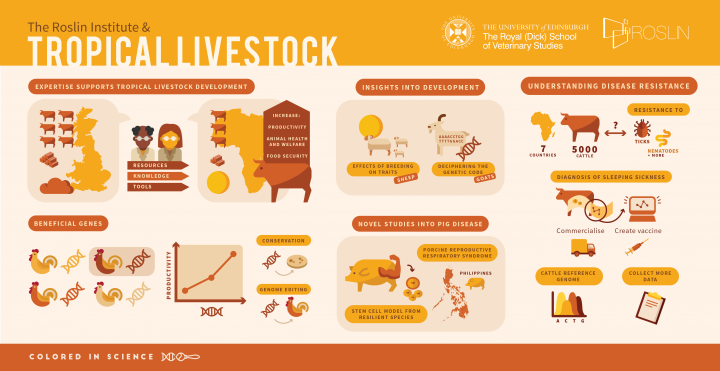Expertise supports tropical livestock management
Understanding the challenges of managing livestock in tropical climates, and harnessing ways of optimising health and productivity.

Roslin researchers are involved in developing tools and resources to improve animal health, welfare and productivity of livestock as well as security of food supplies in low- and middle-income countries.
Their work is influencing breeding strategies relating to livestock, adapting knowledge from systems developed in the West for small scale farming of animals indigenous to low- and middle-income countries, and acknowledging differences in the climate, environment and availability of resources.
Most Roslin activity in this research area is done under the umbrella of the Centre for Tropical Livestock Genetics and Health (CTLGH), a strategic alliance between the Roslin Institute, the International Livestock Research Institute (ILRI) in Kenya and in Ethiopia, and Scotland’s Rural College (SRUC).
CTLGH is funded by the Bill & Melinda Gates Foundation, the UK Government’s Department for International Development (DfID), the Biotechnology and Biological Sciences Research Council (BBSRC) and Jersey Overseas Aid (JOA).
Beneficial genes
Roslin’s work in poultry includes a project to detail the genetic make-up of hundreds of chickens from four key African breeds. Researchers are seeking to identify genes that might be beneficial for growth, and tolerance of heat and disease.
This work is funded by DfID and carried out in concert with projects funded by the Gates Foundation and the UK Research and Innovation’s Global Challenges Research Fund.
Roslin scientists have sought to find genetic signatures in poultry linked to adaptation to tropical environments, in collaboration with the University of Nottingham.
Indigenous African chicken breeds are being preserved using a technique developed at Roslin, in which egg or sperm cells can be frozen and later used to develop live birds from sterile surrogates. The research is supported by DfID. This work has been carried out in collaboration with ILRI, the African Union Inter-African Bureau for Animal Resources (AU-IBAR) and African national livestock research institutes.
Roslin researchers are also exploring the use of genome editing to confer beneficial traits, for example to alter feather shape to improve heat tolerance in tropical poultry production systems.
Disease resistance
Scientists are analysing data on about 5000 cattle from seven East and West African countries, to investigate the genetic basis of resistance to ticks, nematodes, helminths and East Coast fever, in collaboration with SRUC and ILRI and with support from DfID and the Gates Foundation.
The data could also provide valuable details of the genetic diversity of African cattle and long-term strategies for cross-breeding with European breeds.
Insights into sleeping sickness – which can be devastating for livestock – could be made possible by studying the genes of African N’dama cattle, which have evolved resistance to the infection.
Researchers have identified a molecule in the blood which is suitable for use in a test for the disease, which is being developed towards commercialisation, and research is ongoing towards a vaccine, with support from the Gates Foundation.
Detailed data for key immune factors in European and African cattle breeds is underpinning research on resistance to Theileria parasites and other diseases.
Researchers are gathering data, in a large collaboration with ILRI and African partners, to better enable increased productivity and resilience in small-holder farms. They are also developing a reference genome for cattle, incorporating data on global genetic diversity, which will be used to inform future studies and breeding strategies.
Novel studies into pig diseases
Researchers at Roslin have developed a novel stem cell model, using cells derived from pig species that differ in their resistance to African Swine Fever, a globally significant haemorrhagic disease with major welfare impacts.
Roslin scientists are also examining the spread of a serious disease – porcine reproductive and respiratory syndrome – in the Philippines, where many commercial pigs are raised on backyard farms, toward improved diagnostic tests and vaccines.
Genetic insights into development
Data from African sheep populations has enabled scientists to identify how breeding has influenced tail shapes and other traits associated with a tropical environment.
To develop new genetic resources for goats, scientists have deciphered the genetic code of more than 250 goats from a range of breeds that are dispersed across Africa.
These datasets contribute to collaborations including the Vargoats Project, an international consortium that aims to develop a large-scale database of goat genomes for future research.
Researchers are also working with the African Goat Improvement Network, which aims to support conservation and production efforts for small-holder farmers in sub-Saharan Africa.
Ongoing work in collaboration with the European Bioinformatics Institute is aiding understanding of the goat genome, with similar projects continuing for water and African buffalo.
Sharing knowledge
Scientists have established mutually beneficial links with research organisations in numerous African countries and other low- to middle- income countries, including training researchers in their home country and hosting early career researchers at Roslin to build capacity for tropical livestock development.
To expand the adoption of technologies and promote knowledge exchange, Roslin scientists train visiting researchers from institutions in Kenya, Ethiopia, Tanzania, Malawi, Japan, Israel, France, Sweden and the US.
Graphics by Elena Bernabeu at Colored In Science
Related links
Briefing on African Swine Fever
New grant to investigate drug resistance in serious African cattle disease
How bird feathers form in wave-like motion
Diversity is key for sustainable chicken farming in Ethiopia
New poultry facility in Ethiopia explores genetic diversity
DNA study of cow stomachs could aid meat and dairy production


